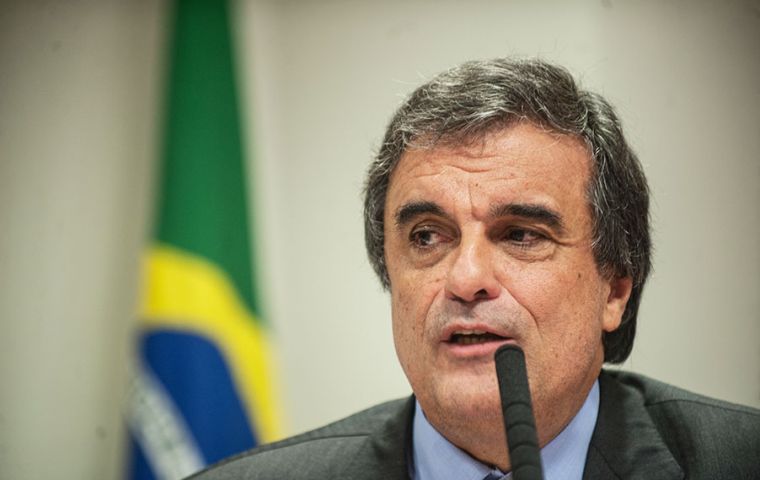MercoPress. South Atlantic News Agency
Striking Brazilian truckers will be fined for roadblocks, warns government
 Cardozo admitted 97 road blocks remain, down from a peak of 119 on Wednesday, as truckers protest in seven states over fuel prices and other costs.
Cardozo admitted 97 road blocks remain, down from a peak of 119 on Wednesday, as truckers protest in seven states over fuel prices and other costs. The Brazilian government will start fining truckers as a strike in its ninth day threatens Latin America’s largest economy with food and fuel shortages. According to a report from Folha de Sao Paulo, the police will fine drivers who block highways as much as 10,000 Reais (3,470 dollars) per hour, Justice Minister Jose Eduardo Cardozo told reporters in Brasilia.
Cardozo admitted 97 road blocks remain, down from a peak of 119 on Wednesday, as truckers protest in seven states over fuel prices and other costs.
Cardozo said it’s impossible to calculate the economic impact of highways blocked since Feb. 18. Companies including food processor BRF SA and JBS SA report that they’ve cut production, and local leaders are concerned gas pumps will run dry as fuel trucks remain stuck in the strike.
Government officials presented a proposal Wednesday after meeting industry and transport representatives to maintain current diesel prices for six months, extend cheap financing for truckers and approve a law regulating working hours, the Executive General Secretary Miguel Rossetto told reporters Wednesday in Brasilia.
Some groups had sought a fuel-price cut and wanted the government to set a floor for freight rates, according to National Transport Command, an organization of truckers. While some unions accepted the proposal, other groups vow to continue the strike. Brazil’s government won’t consider reducing fuel prices, Cardozo said.
“The government’s threats just strengthen our resolve because it shows that they’re understanding the economic impact,” National Transport Command representative Ivar Luiz Schmidt said. “The movement will continue.”
Schmidt added that the government’s data only counts federal highways, and with state roads there are at least 150 road blocks.
In Santa Catarina, a major chicken and pork producer and one of the hardest-hit states, at least 13 road blockages remained, down from 23 Wednesday, the federal highway patrol said. In Mato Grosso, Brazil’s biggest soybean producer, there are still 10 roadblocks. Most of the farmers there are at risk of running out of fuel in five days, which would delay the harvest, said Ricardo Tomczyk, president of agriculture group Aprosoja. About 20% of them already lack diesel to run their tractors.
Abear, the Brazilian airline association, said Wednesday in an e-mail that some airlines are carrying additional fuel on flights to affected areas to ensure they can get back.
Rio de Janeiro-based Vale SA, the world’s largest iron-ore producer, said Thursday that its diesel costs rose 15% to $141 million in the fourth quarter compared to the previous three months because Brazil energy prices haven’t benefited from the decline in international markets.
“Falling oil prices had a limited positive impact on our fuel costs, since prices of diesel in Brazil are not directly correlated to international oil prices,” Vale said in its fourth-quarter financial results release.




Top Comments
Disclaimer & comment rules-

-

-

Read all commentsThe news is late. Since Wednesday an agreement was signed between the truckers and the government. And the number of roadblocks decreased to 59 on Thursday and is expected to decline further on Friday. The delay in completing all unlocks is the lack of a centralized leadership of the strikers and the continental dimensions of Brazil.
Feb 27th, 2015 - 10:54 am 0Brasshole what are you a PT sponsored whore to promote socialist crap?
Feb 27th, 2015 - 03:42 pm 0The strike has not stopped according to media reports http://www.cnbc.com/id/102463016
This is just the start.
Feb 27th, 2015 - 04:13 pm 0There will be plenty more strikes to come.
Commenting for this story is now closed.
If you have a Facebook account, become a fan and comment on our Facebook Page!